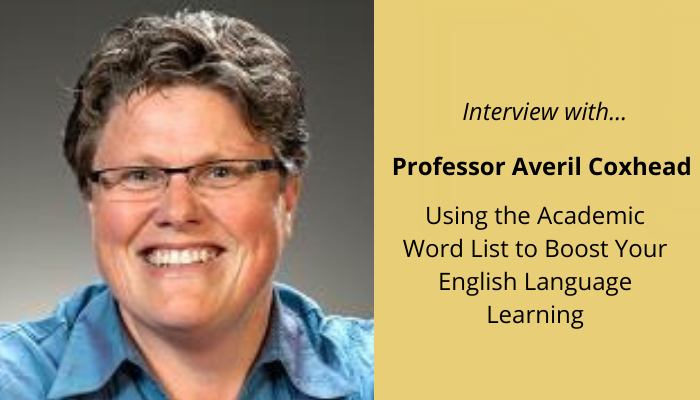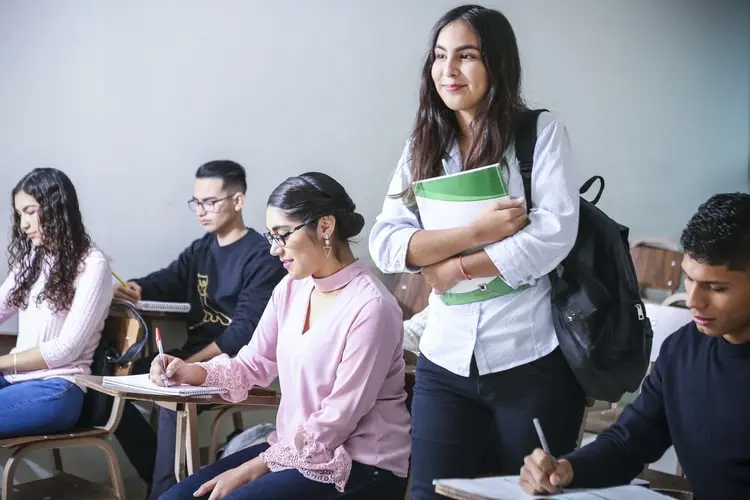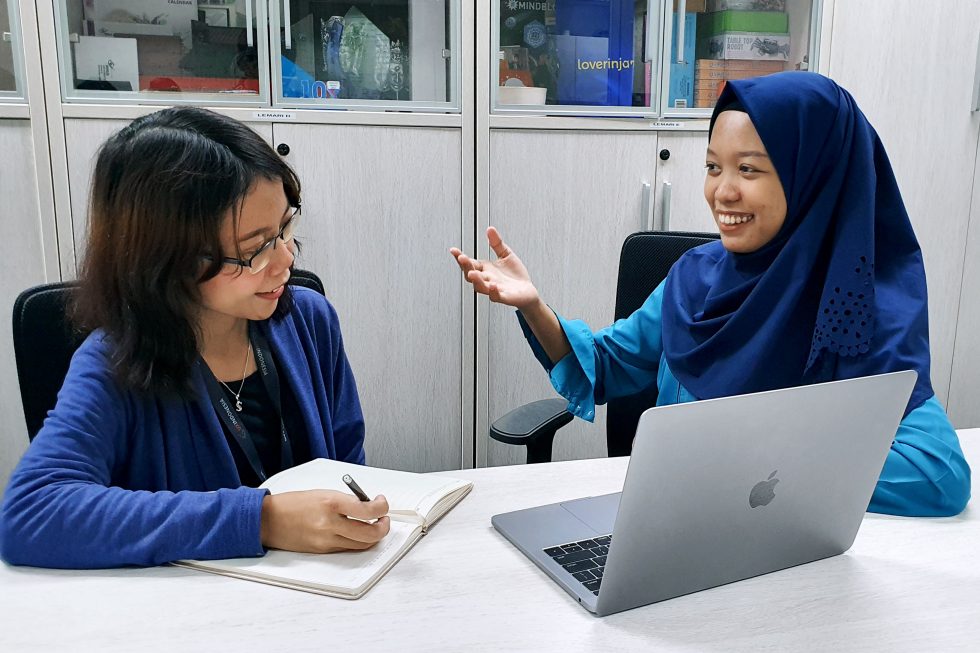Professor Averil Coxhead: An Interview on using the Academic Word Lists to Boost Your English Language Learning
23 June, 2022

Averil Coxhead is an energetic and friendly Professor in Applied Linguistics in the School of Linguistics and Applied Language Studies at the Victoria University of Wellington in New Zealand.
She created the Academic Word List (AWL)- the most widely used and recognised lists of academic words. The list contains over 3000 words, divided into 570 ‘head words’ which can help learners master the vocabulary they need to succeed in an English language academic environment.
We use the list in Text Inspector to analyse academic use of language in texts. It can be used to help EFL students and teachers improve both their teaching and learning experience, and help researchers understand the number of academic words used.
We sat down with her for a virtual chat to discuss her love of vocabulary, how word lists like the AWL can transform language learning and why online gaming might not be so bad after all when it comes to language learning.
Let’s start at the beginning. What sparked your interest in English teaching and language learning?
When I was in primary school here in New Zealand, we had a teacher who taught us Māori songs, some vocabulary and phrases in Te Reo Māori, the indigenous language of New Zealand.
I remember that language learning experience as being really exciting, partly because it involved music but also because it allowed me to communicate with people using another language. I found that really interesting, even as a little kid.
Then when I was 16, I went on an immersion language exchange in Tahiti which changed the way that I thought about learning languages and built in this idea of communication being key for language learning, not just learning grammar rules.
Several years later, when I was doing my bachelor’s degree, I came into contact with a considerable number of language teachers from abroad thanks to something called the Colombo Plan, so a lot of language teachers came into New Zealand.
As many other New Zealanders do, I then took off travelling and during the trip, decided to finally do my RSA Cert. TEFL in Bournemouth. Since then, I’ve taught in New Zealand, England, Estonia, Hungary and Romania.
Your work has mainly focused on vocabulary. What made you so interested in vocabulary specifically?
When I was in that French immersion exchange environment in Tahiti, I realised that my vocabulary was quite lacking and that, although grammar was important, I needed vocabulary and phraseology if I wanted to communicate.
Then, when I was teaching English in Hungary, I realised that although my speaking skills were reasonable, I struggled with the reading and writing aspects of the language.
Why? Because I didn’t have a big enough vocabulary to deal with the texts that were available to me and get enough input. Then in the classroom, I became very conscious that my ESL students didn’t have enough vocabulary to tackle texts either. It’s a real problem with language learning.
When I came back to New Zealand, I met Paul Nation and started to understand more about the research on vocabulary and more specifically, what kinds of words people need. The answer is high-frequency vocabulary [aka the words that are most frequently in a language].
What is the Academic Word List? Why did you create it?
The Academic Word List (AWL) is a list of 570 word families that appear frequently in academic texts and can help English language learners develop the vocabulary they need for success in an English-speaking academic environment.
I started to develop this list when I came back from abroad to do my postgraduate degree after six years. During that period, Professor John Read mentioned the University Word List, which was early work that Paul Nation had done, saying “Someone really needs to update this.”
Immediately, a lightbulb went on in my head and I thought, “That sounds like something I need to get involved in”. I was an English for Academic Purposes teacher at the time, I could see that this was the opportunity to get my learners the vocabulary they needed. So I went to meet Paul Nation.
The feedback I’ve received since doing this project has been great. I’ve had students come to me and thank me for helping them to gain entrance to university using the AWL, even when they don’t realise that I developed it.
That for me as a researcher and a teacher is when I realise the value of the work I’ve done when combined with the hard work of my students.
How can examiners, teachers, students and materials writers make the best use of wordlists like the AWL?
The most important thing for vocabulary learning is you always want to be sure that the words that you’ve learned (or that you’re asking your learners to learn) are the really frequent ones so they can give you ‘better bang for your buck’.
Word lists can help with that. They can help identify these most frequent words, tell you more about how they work and allow you to develop your vocabulary knowledge strategically.
1. Start with the most frequent words
First look at what the most frequent words are in the word list and focus your attention on teaching or learning these. Then make sure you’re getting exposure to these words in context which in this case, is via academic texts.
Although there’s a place for decontextualized learning by using flashcards and so on, it’s more effective when you’re really thinking about how you use the word and getting exposure to the words in context which underpins it all.
If the learning starts and stops with working with words in a very mechanical way, it doesn’t become part of learners’ vocabulary in use particularly easily.
2. Learn how word families get formed in English
Then the second thing is learning about how word families get formed in English. This allows the student to recognise certain grammatical forms such as prefixes and suffixes so that they can understand the meaning of words, even if they haven’t come across that particular structure before. It also helps them reach their overall goal of trying to increase their vocabulary size.
3. Start setting goals
The other thing with word lists is that they’re helpful when it comes to setting goals. You can find out how many words you need to learn to know, or what kinds of words your learners know, and then the word list can help you say, “Well, what are the next words? What’s the next target for you?”
The Academic Word List is divided into sublists of 60 words which is an achievable, bite-sized goal that most learners can handle easily.
4. Find resources to learn the words in context
Again, whenever possible you should be exposing yourself or your students to the new vocabulary in context. The development of fantastic websites such as Text Inspector where students and learners can explore more about the words in the text is fantastic as they can have hands-on experience.

In your opinion, what is the best way to learn vocabulary?
Like others in the Paul Nation camp, I believe that our focus shouldn’t be on teaching academic vocabulary per se but on ensuring that English learners are getting adequate amounts of both input and output and become good vocabulary learners.
- Adequate input
You learned your first language through lots and lots of listening, reading and talking with people. But for language learners, the input they need is a lot more input than they get. We need to encourage them to get as much exposure to the language as possible, ideally focussing on the specific language area they want to master.
For example, if they are learning English for business, they should include business texts in their exposure. Likewise, English for Academic Purposes students should get exposure to academic texts as much as possible.
However, we know that if you’re learning new words and you get new context or new knowledge at the same time, it makes it really hard. We need to make sure they’re getting lots and lots of input on things that are high interest, relevant to their lives and that they already know about.
If learners already know and understand the topic in their first language, then the focus is not so much on the ideas, but about the language that they need to express those ideas. It makes it much easier.
- Fluency practice
Output is another really important part of the language learning journey. We all recognize many more words and language than we produce so one of the difficulties for language learners is that they might know these words or recognize these words but they can’t use them.
That’s why we also need to look at fluency practice- making sure that learners have plenty of opportunities for using the language that they know well so that they get more and more fluent.
I’ve recently written a chapter in a book called ‘Vocabulary in the Four Skills’ where I explain the benefit of learners doing an activity such as keeping a diary. It helps them solidify new vocabulary in their mind, demonstrate their knowledge, get lots of writing practice and develop their fluency.
Unfortunately, a lot of learning is language-focused learning, where you’re focused on the pronunciation, on the spelling and the grammatical properties of a word, for example. But it’s all that other relevant input and output that we really need.
- Testing
In terms of testing, the focus needs to be more on what we can do and how we can plan for this vocabulary as teachers.
How can we make sure that we know what our learners already know and therefore what they need to know? Using word lists such as the AWL can play a huge part in this planning and testing process.
Do you believe that technology can help or hinder language learning?
I have a lot of optimism about technological tools being used at the moment because it can provide language learners with the ideal opportunity to improve their language skills, even if they’re not considered traditional language learning behaviours.
Often, they get what Paul Nation highlights as key for language learning in his four strands: large amounts of input, large amounts of output and plenty of fluency practice through playing massive online games.
I have a funny story about this. While taking part in a project that was testing vocabulary size, I came across a group of young non-native English speaking men whose vocabulary was a lot like native speakers.
I took them aside from the testing and said, “You guys are good. Why are you so different from everybody else?” They all looked at each other, laughed and looked at the floor.
As you can imagine, I wondered what the answer was going to be. It turns out that they all played World of Warcraft so were all massive online gamers. They spent hours and hours and hours directing in English, reading English, taking part in the games that they’re playing with high interest.
One of my students who’s just finished her PhD research was talking to language learners about this online, massive game playing activity that encourages language skills. One of the people that she talked to said, “Look, in the language class, I can look away, but when I’m playing World of Warcraft, I can’t look away from the screen. I’m so involved in what I’m doing”.
These English students are getting so much more exposure to the language and using the language than they would normally get in a language learning classroom, which is great.
What does the future hold for you and your research? What other areas have you been working on?
I’ve recently been working on a project called the “Language and Trades Education Project” or LATTE. This focused on specialised vocabulary for trades in different specialized areas and looks at how many words learners need to tackle different kinds of texts, especially technical written texts in New Zealand polytechnics.
We’ve discovered that these ESL learners actually need the same size vocabulary as someone who’s trying to read university-level texts.
These are very difficult texts- you need 9,000 word families to be able to just cope with the text, then you need much more than that to be proficient at reading the texts. These are highly technical documents.
As a result of this work, we’ve got now we’ve got the plumbing word list, a carpentry word list, a fabrication word list, a fabrication word list and an automotive technology word list.
We’ve translated those into Tongan so that we now have bilingual English- Tongan technical trades word lists.
In terms of future research, I’m keen to do much more in that space and to do more on resources looking into bilingualism.
The technical vocabulary area is particularly interesting, especially if people already have the knowledge in their first language and they’re building the same vocabulary knowledge in their second language.
Summary: key takeaways from the interview
Here are some of the key points to remember from our interview with Professor Averil Coxhead:
- Start with the most frequent vocabulary words.
- Learning new vocabulary should be learned in context whenever possible.
- Use topics already familiar and relevant to the learner.
- Ensure that students get plenty of input and output– they usually don’t get enough.
- Use word families to learn how words are formed in English.
- The vocabulary used in trades is surprisingly complex and difficult.
- Set goals for language learning.
- Even online gaming can provide excellent language learning opportunities for students.
- Keeping a diary in a second language can be a powerful way to reinforce writing. skills and to practice vocabulary recall.
- Text Inspector can help you get hands-on experience when it comes to analysing the vocabulary content of texts.

What would you like to see next on our blog?
Send us your ideas at helpteam@textinspector.com
Share
Related Posts

Lexical Profiles According to the CEFR: What Does Research Say?
23 June, 2022
One of our most widely used tools, the Text Inspector Scorecard uses widely respected metrics to explain […]
Read More ->
How to Analyse a Text in English with Text Inspector
23 June, 2022
Whether you’re interested in understanding the structure and complexity of a text, you want to […]
Read More ->
Lexical Diversity: An Interview with Aris Xanthos
23 June, 2022
Aris Xanthos is a lecturer and researcher in Humanities Computing at the University of Lausanne, CEO […]
Read More ->